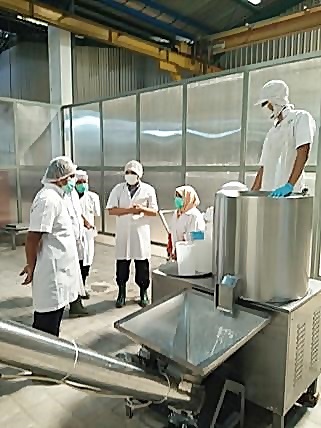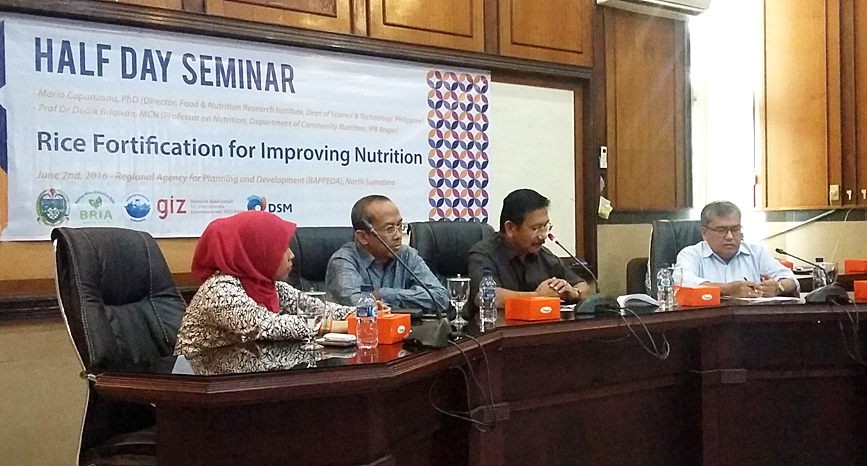According to the 2013 Indonesian Basic Health Research of the Ministry of Health, 37.1 per cent of pregnant women, 28.1 per cent of children under five years and 26.4 per cent of school children are anaemic.
Indonesia is one of 17 countries with worrying nutrition problems, placing the country’s nutrition status at the same level as African countries, according to the International Food Policy Research Institute’s Global Nutrition Report. The Indonesian population still consumes less than 50 per cent of the amount of vitamins and minerals needed. Iron Deficiency Anaemia (IDA) is a serious health issue that compromises the cognitive development of young children and increases the risk for maternal death at birth. According to Riskesdas 2013 (Indonesian Basic Health Research) of the Ministry of Health, 37.1 per cent of pregnant women, 28.1 per cent of children under five years and 26.4 per cent of school children are anaemic.
In Indonesia, BRIA has two components, namely Agriculture and Nutrition. The Nutrition Component was concluded in 2016 and its overall objective was to enhance the nutritional status of poor population groups in Indonesia. Broadly, BRIA promoted three complementary measures to tackle micronutrient deficiencies: (1) supplementation as a short-term measure, (2) food fortification as a highly cost-effective medium-term measure, and (3) dietary diversification as the long-term solution to malnutrition. Dietary diversification requires long-term behaviour changes and is strongly related to the availability of nutritious foods. However, food fortification can reach a broader target group through current market channels.
The Nutrition Component consisted of two sub-components: oil fortification and rice fortification. The objectives were (i) to improve quality assurance (QA) and quality control (QC) for vitamin A-fortified edible oil; (ii) increase access to micronutrient fortified rice, especially for poor and vulnerable population groups; (iii) promote a healthy diet/broader nutrition deriving from the “daily rice bowl.”
The private sector project partners for oil fortification and rice fortification were BASF Nutrition, DSM and GAIN (Global Alliance for Improved Nutrition). The main public sector partners were the Indonesian Ministry of Agriculture (MoA), the Indonesian Ministry of National Development Planning (BAPPENAS), as well as the Indonesian National Agency of Drug and Food Control (BPOM). Further partners such as research institutions, schools, rice millers and traders were involved directly and indirectly in the implementation of several activities such as oil fortification, trial production of premix kernels for rice fortification, social market research related to rice fortification, a clinical study of rice fortification, and different stakeholder workshops as well as rice value chain training to promote rice fortification at various levels.
Rice plays an important role in the Indonesian diet and about 95 per cent of Indonesians consume rice every day. The average intake of rice in Indonesia is 197.1 grams per capita per day. According to international studies, fortification of rice has good efficacy in reducing IDA. As a major result, BRIA successfully stimulated the interest of the private sector to join the fortified rice business since the technology and production process has been domestically tested and proven. BRIA promotes fortification of local rice that is suitable for the nutritional needs and preferences of the Indonesian market. A number of small and big companies have become interested in producing premix kernels and fortified rice.
Furthermore, the Nutrition Component sought to improve the health and wellbeing of targeted households in Indonesia by promoting through social marketing, increased variety and quality of household dietary intake with healthy diet/broader nutrition deriving from the daily rice bowl. To achieve this goal, nutrition messages about the “daily rice bowl” were developed, tested and shared with the larger public.
The positive results and remaining nutritional challenges in Indonesia lead to a final strong suggestion that the nutrition programme should be continued since a revised regulation of the Ministry of Industry to align the provisions of fortified cooking palm oil, which has been mandatory from March 2016, needs to be supported to ensure its implementation at the industrial level and on the ground. Incentives, technical assistance and technology transfer need to be promoted and provided for the industries to produce premix kernels for rice fortification and fortified rice. Last but not least, public awareness of rice fortification at all stakeholder levels such as government, private sector, and communities needs to be initiated, enhanced and supported.


